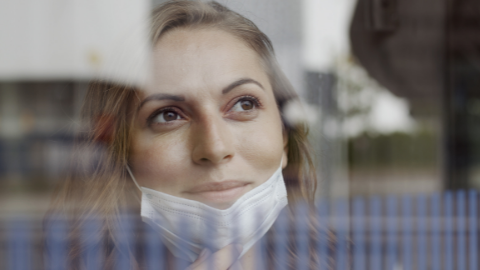Resiliency Aided Utah Women During COVID-19

A recent study from the Utah State University Utah Women & Leadership Project (UWLP) outlined specific challenges women in the workforce faced during COVID-19. An online survey was conducted in January in conjunction with USU Extension and was completed by 3,542 Utah women age 20 or older who were either currently employed or unemployed due to the pandemic.
Fifth in a series of related reports from the study, this research highlights the connection between a resilient mindset and wellbeing levels. It also focuses on the associations among spousal support and workplace support as they relate to resiliency and wellbeing.
According to Susan Madsen, founding director of the UWLP and one of four authors of the study, research shows that resilient individuals use positive emotions to bounce back from stressful and other emotional experiences quickly and effectively.
“Since the COVID-19 pandemic is ongoing, developing and strengthening resiliency can help Utah women and families have the ability to rebound and thrive,” she said.
The UWLP report described a connection between resilience and a growth mindset, which is the belief that people can cultivate and improve talents, abilities and intelligence through efforts, strategies and learning. On the opposite end is the fixed mindset, the belief that people’s basic qualities, such as intelligence and talent, are fixed traits that cannot be changed or developed.
In an effort to better understand these traits, researchers presented survey participants with this statement: “If I should find myself in a jam, I could think of many ways to get out of it.” Results included: 50, strongly disagree; 188, disagree; 265, somewhat disagree; 419, neutral; 934, somewhat agree; 951, agree; 390, strongly agree.
Comparing the averages of the effect of the resilient vs. the less-resilient mindset on wellbeing during the pandemic, those who maintained a more resilient mindset appeared to have experienced less physical health decline, less mental health decline, less additional burnout and less worry, on average, than those who did not maintain this perspective.
According to study author Jared Hansen, USU associate professor of marketing, further data indicates a clear association between those who viewed less equitable sharing of household chores, decreased perceptions of physical and mental health, and increased levels of burnout and worry about family members’ health.
“These findings suggest that a resilient mindset results in better wellbeing compared with a less-resilient mindset, even given less support at home,” he said. And regarding workplace support during the pandemic, there was strong overlap among those with a similar level of resilient mindset, regardless of whether there was a flexible work location. Thus, the resilient mindset of the workers appears to be even more valuable than workplace location accommodation.”
Madsen said it could be that resilient people feel higher levels of wellbeing or it could be that those who perceive higher wellbeing are more resilient.
“Whichever it is, research supports the link between resilience and wellbeing,” she said.
“It also aligns with global research findings that this type of mindset is linked to numerous benefits for individuals and organizations. As Utah leaders and residents do more to understand the challenges faced during COVID19, it will help craft a more equitable recovery. This will, in turn, strengthen our businesses, families, communities and the state as a whole.”
Additional researchers for the study are Joseph Hansen, CEO, BuyBox Experts and Chris Hartwell, USU associate professor of management. The full study can be found at https://www.usu.edu/uwlp/files/briefs/36-covid-19-resilient-mindset-wellbeing.pdf or https://tinyurl.com/2xn9nj8r. Further information about the UWLP can be found at utwomen.org.
Writer: Julene Reese, Julene.reese@usu.edu
Contact: Susan Madsen, Susan.madsen@usu.edu


 Utah 4-H & Youth
Utah 4-H & Youth